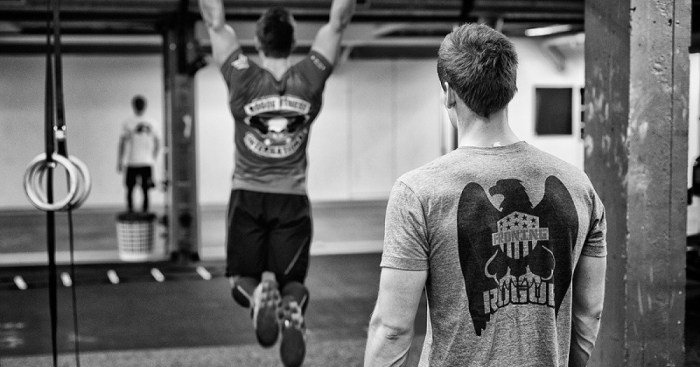Master fitness trainer, a title that embodies expertise, dedication, and a passion for helping others achieve their fitness goals. This guide delves into the multifaceted world of master fitness trainers, exploring their responsibilities, qualifications, and the essential knowledge and skills required to excel in this dynamic field.
From understanding the intricacies of human anatomy and physiology to crafting personalized training programs and motivating clients, master fitness trainers play a pivotal role in guiding individuals towards a healthier and more fulfilling life. We’ll explore the diverse specializations within the field, the ethical considerations that underpin the profession, and the business aspects of building a successful fitness training career.
The Role of a Master Fitness Trainer

Master fitness trainers are highly skilled professionals who guide individuals in achieving their fitness goals. They possess extensive knowledge and expertise in various aspects of fitness, health, and wellness, enabling them to design personalized training programs and provide expert guidance.
Core Responsibilities
Master fitness trainers are responsible for assessing clients’ fitness levels, setting realistic goals, and developing customized training plans. They provide expert instruction on exercise techniques, nutrition, and lifestyle modifications. Their responsibilities also include:
- Conducting fitness assessments, including body composition analysis, cardiovascular assessments, and flexibility evaluations.
- Developing and implementing personalized training programs tailored to clients’ needs, goals, and limitations.
- Providing guidance on proper exercise techniques, ensuring safety and effectiveness.
- Monitoring clients’ progress, making adjustments to training plans as needed.
- Educating clients on nutrition, health, and wellness principles.
- Motivating and encouraging clients to achieve their fitness goals.
- Maintaining accurate records of client progress and training sessions.
- Staying current with the latest fitness trends, research, and best practices.
Qualifications and Certifications
Master fitness trainers typically hold advanced certifications and have extensive experience in the fitness industry. They are highly qualified professionals who have demonstrated their knowledge and expertise through rigorous training and examinations. Common qualifications include:
- A bachelor’s degree in exercise science, kinesiology, or a related field.
- Certifications from reputable organizations such as the National Academy of Sports Medicine (NASM), American Council on Exercise (ACE), or the American College of Sports Medicine (ACSM).
- Continuing education courses to maintain certifications and stay up-to-date with industry advancements.
- Significant experience working with diverse populations, including individuals with special needs or injuries.
Specializations
Master fitness trainers often specialize in specific areas of fitness, catering to the unique needs of their clients. Some common specializations include:
- Strength and Conditioning:Focuses on building muscle mass, improving strength, and enhancing athletic performance.
- Weight Management:Assists clients in achieving healthy weight loss or gain through exercise and nutrition guidance.
- Rehabilitation:Works with individuals recovering from injuries or surgeries to regain mobility and strength.
- Prenatal and Postnatal Fitness:Provides safe and effective exercise programs for expectant and postpartum mothers.
- Senior Fitness:Develops exercise programs tailored to the needs of older adults, focusing on maintaining mobility, strength, and balance.
Ethical Considerations and Professional Standards
Master fitness trainers adhere to a strict code of ethics and professional standards. They prioritize the safety and well-being of their clients, maintaining confidentiality and respecting their individual needs and goals.
A master fitness trainer understands that a holistic approach to health is crucial. This includes not only physical fitness but also mental and emotional well-being, which is why they often recommend exploring the benefits of self-care practices like visiting a beauty house for a relaxing massage or facial.
Ultimately, a master fitness trainer helps you achieve a balanced lifestyle that promotes both physical and mental strength.
“Master fitness trainers are committed to providing ethical and professional services, ensuring the safety and well-being of their clients while fostering a positive and supportive environment.”
Mastering Fitness Knowledge and Skills

To become a master fitness trainer, a deep understanding of various disciplines is essential. This encompasses a comprehensive knowledge of anatomy, physiology, biomechanics, nutrition, and exercise science. Master trainers are experts in their field, equipped with advanced training techniques and methodologies, and are committed to ongoing professional development to remain at the forefront of fitness trends.
Expertise in Anatomy, Physiology, Biomechanics, Nutrition, and Exercise Science
A master fitness trainer possesses a thorough understanding of the human body, its functions, and how movement affects it. This expertise allows them to design effective training programs that optimize performance and minimize injury risk.
- Anatomy:Master trainers understand the structure of the human body, including bones, muscles, joints, and ligaments. This knowledge is crucial for designing exercises that target specific muscle groups and prevent imbalances.
- Physiology:A deep understanding of how the body functions, including energy systems, cardiovascular systems, and the role of hormones, is essential for designing effective training programs. This knowledge allows trainers to tailor workouts to individual needs and goals.
- Biomechanics:Master trainers understand the principles of movement and how forces affect the body. This knowledge is crucial for analyzing movement patterns, identifying potential problems, and correcting form to prevent injury.
- Nutrition:Master trainers understand the role of nutrition in performance, recovery, and overall health. They can advise clients on proper nutrition strategies to support their fitness goals.
- Exercise Science:Master trainers are well-versed in exercise science principles, including training methods, program design, and the effects of different types of exercise on the body. They can apply this knowledge to create personalized training plans that are safe and effective.
Advanced Training Techniques and Methodologies
Master trainers are adept at using a wide range of training techniques and methodologies to maximize client results. They stay current with the latest research and trends, integrating innovative approaches into their training programs.
- Functional Training:This method focuses on training movements that mimic real-life activities, improving overall fitness and functional strength.
- High-Intensity Interval Training (HIIT):HIIT involves short bursts of intense exercise followed by brief recovery periods, offering a time-efficient way to improve cardiovascular fitness and burn calories.
- Circuit Training:This method involves performing a series of exercises in a circuit, moving from one exercise to the next with minimal rest, promoting muscular endurance and cardiovascular fitness.
- Strength Training:Master trainers incorporate strength training exercises using various equipment and techniques to build muscle mass, increase strength, and improve bone density.
- Flexibility and Mobility Training:Master trainers recognize the importance of flexibility and mobility for injury prevention and overall performance. They incorporate exercises that improve range of motion and joint health.
Continuing Education and Professional Development
The fitness industry is constantly evolving, and master trainers are committed to lifelong learning. They actively participate in continuing education programs, conferences, and workshops to stay updated on the latest research, techniques, and trends.
- Certifications and Specializations:Master trainers often pursue specialized certifications in areas like sports performance, nutrition, or rehabilitation, demonstrating their commitment to advanced knowledge and skills.
- Professional Organizations:Master trainers are members of professional organizations like the National Strength and Conditioning Association (NSCA) or the American College of Sports Medicine (ACSM) to stay connected with the fitness community, access resources, and network with peers.
- Reading and Research:Master trainers are avid readers and researchers, staying informed about the latest scientific studies and best practices in the fitness industry.
- Mentorship and Collaboration:Master trainers seek guidance and support from experienced mentors and collaborate with other professionals in the field to enhance their knowledge and skills.
Assessing Client Needs and Goals
Master trainers excel at understanding individual client needs and goals. They conduct thorough assessments, including physical evaluations, fitness testing, and lifestyle analysis, to develop personalized training plans that are safe, effective, and motivating.
A master fitness trainer understands the importance of a holistic approach to well-being, which includes taking care of both your physical and mental health. Looking good often plays a role in feeling good, and finding a black beauty shop near me can be a great way to boost your confidence.
A master fitness trainer can help you achieve your fitness goals, while a beauty shop can help you achieve your aesthetic goals, both contributing to a sense of overall wellness.
- Initial Consultation:The initial consultation is crucial for establishing rapport with the client and gathering information about their health history, fitness level, goals, and lifestyle.
- Physical Evaluation:Master trainers conduct a physical evaluation to assess posture, range of motion, and any limitations or injuries. This helps identify potential areas of concern and tailor the training program accordingly.
- Fitness Testing:Fitness tests, such as body composition analysis, cardiovascular fitness assessments, and strength testing, provide valuable data to establish a baseline and track progress over time.
- Lifestyle Analysis:Master trainers consider the client’s lifestyle factors, including work, sleep, stress levels, and dietary habits, to create a holistic approach to fitness that promotes long-term success.
Client Assessment and Program Design

A comprehensive client assessment is the foundation of a successful fitness program. It allows master trainers to understand their clients’ unique needs, goals, and limitations, enabling them to design personalized training plans that are effective and safe.
The Client Assessment Process
A thorough client assessment involves a series of steps to gather essential information about the client.
- Initial Consultation:This is the first step to build rapport and understand the client’s fitness history, goals, and motivations. It’s an opportunity to ask open-ended questions to gain a holistic understanding of the client’s lifestyle, including their daily routine, dietary habits, and any existing health conditions or injuries.
- Physical Evaluation:This includes assessing the client’s current fitness level, range of motion, posture, and body composition. It involves a series of tests, such as:
- Cardiovascular Endurance:This can be assessed using a variety of tests, including the treadmill test, the bike test, or the step test. The results provide insight into the client’s ability to perform sustained physical activity.
- Musculoskeletal Strength and Endurance:This can be evaluated through tests like push-ups, squats, and pull-ups, which assess the strength and endurance of major muscle groups.
- Flexibility and Range of Motion:Tests like the sit-and-reach test and the shoulder flexibility test measure the client’s ability to move through a full range of motion. This helps identify areas of tightness or restriction.
- Body Composition:This refers to the proportion of fat, muscle, bone, and water in the body. It can be assessed using methods like skin calipers, bioelectrical impedance analysis, or hydrostatic weighing.
- Goal Setting:This involves collaborating with the client to set realistic and achievable fitness goals. Goals should be specific, measurable, achievable, relevant, and time-bound (SMART). It’s important to ensure that the client’s goals are aligned with their overall health and well-being.
- Lifestyle Analysis:This involves assessing the client’s daily routines, including their sleep habits, stress levels, and dietary choices. Understanding these factors is crucial for identifying potential barriers to fitness success and developing strategies to overcome them.
Fitness Program Design
Once the client assessment is complete, the master trainer can begin designing a customized fitness program.
- Program Objectives:The program should be designed to address the client’s specific goals, whether they are focused on weight loss, muscle gain, improved cardiovascular health, or increased flexibility.
- Exercise Selection:The master trainer should choose exercises that are appropriate for the client’s fitness level, considering their strengths, weaknesses, and any limitations. Exercises should target all major muscle groups and be varied to prevent boredom and promote continued progress.
- Training Frequency and Duration:The program should include a training schedule that balances exercise with rest and recovery. The frequency and duration of workouts should be tailored to the client’s individual needs and goals.
- Intensity and Progression:The program should progressively increase in intensity over time to challenge the client and promote continuous improvement. The master trainer should monitor the client’s progress and adjust the program accordingly.
Tailoring Programs for Different Populations
Master trainers must adapt their training plans to the specific needs and goals of different populations.
- Athletes:Programs for athletes should focus on improving performance, preventing injuries, and optimizing recovery. This may involve incorporating high-intensity training, plyometrics, and sport-specific drills.
- Seniors:Programs for seniors should prioritize safety, balance, and functional fitness. This may involve low-impact exercises, resistance training with lighter weights, and activities that improve mobility and coordination.
- Individuals with Special Needs:Programs for individuals with special needs should be tailored to their specific conditions and limitations. The master trainer should work closely with the client’s healthcare providers to ensure that the program is safe and effective.
Motivational Strategies and Progress Tracking
Master trainers play a vital role in motivating clients to achieve their fitness goals.
- Setting Realistic Goals:It’s crucial to establish achievable goals that are motivating and attainable. This helps prevent discouragement and maintains the client’s commitment to the program.
- Providing Positive Reinforcement:Encouragement and praise for progress, no matter how small, are essential for maintaining motivation. This helps the client feel supported and confident in their abilities.
- Progress Tracking:Regularly monitoring progress through assessments and measurements helps clients see tangible results, which can be a powerful motivator. This allows the master trainer to make adjustments to the program as needed.
Communication and Client Management: Master Fitness Trainer

Effective communication is the cornerstone of a successful client-trainer relationship. It fosters trust, understanding, and a shared commitment to achieving fitness goals.
Building Rapport and Trust
Building rapport and trust is essential for establishing a strong client-trainer relationship. It involves active listening, empathy, and genuine interest in the client’s well-being and goals.
- Active Listening:Pay attention to both verbal and nonverbal cues. Ask clarifying questions and summarize key points to ensure understanding.
- Empathy:Try to understand the client’s perspective and motivations. Acknowledge their feelings and challenges.
- Genuine Interest:Show genuine interest in the client’s life, goals, and aspirations. Ask about their interests and hobbies beyond fitness.
- Clear and Concise Communication:Use language that is easy to understand and avoid technical jargon. Explain concepts in a way that is relatable to the client.
Motivating and Encouraging Clients
Motivation is crucial for sustained progress. Effective trainers use various strategies to inspire and encourage clients to stay on track.
- Set Realistic Goals:Help clients set achievable goals that are challenging but not overwhelming. Break down larger goals into smaller, more manageable steps.
- Positive Reinforcement:Praise and acknowledge progress, no matter how small. Focus on achievements and celebrate milestones.
- Personalized Approach:Tailor motivational strategies to individual client preferences. Some clients respond well to encouragement, while others prefer a more data-driven approach.
- Accountability:Establish a system for regular check-ins and progress updates. Encourage clients to track their progress and share their achievements.
Client Appointment, Progress, and Feedback Management
A well-organized system for managing client appointments, progress, and feedback is essential for efficient and effective training.
- Appointment Scheduling:Use a scheduling system that allows for easy booking, rescheduling, and reminders. Communicate appointment details clearly and promptly.
- Progress Tracking:Use a method for tracking client progress, such as a workout log, fitness assessment results, or a progress chart. Regularly review progress with clients and make adjustments as needed.
- Feedback Collection:Encourage clients to provide feedback on their training experience. Use this feedback to improve your services and tailor future sessions.
Ethical Considerations, Master fitness trainer
Ethical considerations are paramount in the client-trainer relationship. Maintain professionalism, confidentiality, and respect for client autonomy.
- Confidentiality:Respect client privacy and keep all information confidential.
- Professional Boundaries:Maintain professional boundaries at all times. Avoid personal relationships or inappropriate behavior.
- Informed Consent:Obtain informed consent from clients before starting any training program. Clearly explain the risks and benefits of the program.
- Competence:Only provide services within your area of expertise. Refer clients to other professionals when necessary.
The Business of Fitness Training

Building a successful career as a master fitness trainer requires more than just expertise in exercise science and coaching. It also involves understanding the business side of fitness, including different business models, effective marketing strategies, and sound financial management.
Business Models for Master Fitness Trainers
Master fitness trainers can choose from various business models, each offering unique advantages and challenges. Here are some common options:
- Independent Contracting:This model allows trainers to work independently, setting their own rates and schedules. They can offer their services at gyms, studios, or even in clients’ homes. Independent contractors are responsible for their own marketing, insurance, and taxes.
- Gym Ownership:Owning a gym provides complete control over the business, allowing trainers to set their own training philosophy and create a unique brand. However, gym ownership involves significant financial investment, operational responsibilities, and business management skills.
- Online Coaching:Online coaching allows trainers to reach a wider audience, regardless of geographic location. This model involves creating online programs, providing remote guidance, and using technology for client communication and tracking. Online coaches need strong digital marketing skills and the ability to build trust and rapport remotely.
Marketing and Promoting Fitness Training Services
Marketing is essential for attracting clients and building a successful fitness training business. Here are some effective marketing strategies:
- Networking:Building relationships with other fitness professionals, gym owners, and community organizations can generate referrals and create opportunities for collaboration.
- Social Media:Creating engaging content on platforms like Instagram, Facebook, and YouTube can help establish a personal brand, showcase expertise, and reach potential clients.
- Website:A professional website provides a platform to share information about services, testimonials, and contact details. It can also serve as a landing page for online marketing campaigns.
- Community Involvement:Participating in local events, offering free workshops, or partnering with community organizations can raise awareness and build trust within the community.
Financial Management and Business Planning
Sound financial management is crucial for the long-term success of any fitness training business. Here are some key considerations:
- Budgeting and Financial Planning:Creating a realistic budget that accounts for expenses, income, and savings is essential for managing cash flow and making informed financial decisions.
- Pricing Strategies:Determining appropriate pricing for services involves considering factors such as experience, qualifications, market demand, and competition.
- Tax Compliance:Understanding tax obligations and seeking professional advice can help ensure compliance and minimize tax liabilities.
- Record Keeping:Maintaining accurate records of income, expenses, and client interactions is important for financial reporting, tax purposes, and business analysis.
Resources and Support Networks
Master fitness trainers have access to various resources and support networks that can enhance their professional development and business success:
- Professional Organizations:Joining professional organizations like the National Academy of Sports Medicine (NASM) or the American College of Sports Medicine (ACSM) provides access to continuing education, networking opportunities, and industry resources.
- Mentorship Programs:Seeking guidance from experienced fitness professionals can provide valuable insights, support, and accountability.
- Business Coaching:Working with a business coach can help develop business skills, create strategic plans, and overcome challenges.
- Online Communities:Online forums and social media groups dedicated to fitness professionals offer a platform for sharing knowledge, seeking advice, and connecting with peers.
The Future of Fitness Training

The fitness industry is constantly evolving, driven by technological advancements, changing consumer preferences, and a growing awareness of the importance of health and wellness. As a result, the role of the master fitness trainer is also transforming, requiring them to embrace new technologies, adapt their skillsets, and stay ahead of emerging trends.
Emerging Trends and Technologies
The fitness industry is witnessing a rapid integration of technology, transforming the way people exercise and interact with fitness professionals. Here are some key trends:
- Wearable Technology:Devices like smartwatches and fitness trackers are becoming increasingly sophisticated, providing real-time data on heart rate, calories burned, sleep patterns, and other metrics. This data empowers both trainers and clients to track progress, personalize workouts, and achieve better results.
A master fitness trainer understands the importance of a holistic approach to well-being, which includes not just physical fitness but also mental and emotional health. This can often involve elements of self-care, such as taking time for relaxation and pampering.
For those seeking a retail therapy experience, a visit to beauty store ulta could be a perfect way to unwind and indulge in a little self-care. Ultimately, a master fitness trainer aims to guide individuals towards a balanced and fulfilling lifestyle, incorporating elements of physical activity, mental well-being, and personal enjoyment.
- Virtual and Augmented Reality (VR/AR):Immersive technologies like VR and AR are revolutionizing the fitness experience. VR workouts offer a more engaging and interactive experience, while AR can overlay virtual elements onto the real world, enhancing training sessions. Examples include virtual cycling classes that simulate real-world routes or AR applications that guide users through exercises with real-time feedback.
- Artificial Intelligence (AI):AI is playing a growing role in fitness, from personalized workout recommendations to automated coaching. AI algorithms can analyze user data and provide tailored advice, creating customized fitness plans that adapt to individual needs and preferences.
- Remote Fitness Coaching:The rise of remote work and the increasing demand for convenience have fueled the growth of online fitness coaching. This trend allows trainers to reach a wider audience and provide personalized guidance from anywhere in the world, using video conferencing, fitness apps, and wearable technology.
- Personalized Fitness Solutions:The future of fitness is moving towards personalized solutions, taking into account individual goals, preferences, and limitations. This includes tailored workout plans, nutrition guidance, and mental health support, delivered through a combination of technology and human expertise.
Skills and Knowledge in High Demand
To thrive in this evolving landscape, master fitness trainers need to develop a unique set of skills and knowledge:
- Technology Proficiency:Master trainers need to be comfortable using and integrating various fitness technologies, including wearable devices, fitness apps, virtual reality platforms, and AI-powered tools. This includes understanding data analysis, interpreting results, and leveraging technology to enhance client experiences.
- Data Analysis and Interpretation:With the influx of data from wearable devices and fitness apps, master trainers must be able to analyze and interpret this information to create personalized training plans and track client progress effectively. Understanding data visualization and statistical analysis will be crucial.
- Personalized Training Strategies:Master trainers need to be adept at creating customized training programs that cater to individual needs, goals, and limitations. This involves understanding different training methodologies, tailoring workouts to specific populations, and adapting to individual preferences.
- Communication and Client Management:Effective communication is vital for building strong client relationships and motivating them to achieve their fitness goals. Master trainers need to be skilled communicators, able to explain complex concepts clearly, provide constructive feedback, and build rapport with clients. They should also be adept at managing client expectations, addressing concerns, and fostering a positive and supportive training environment.
- Business Acumen:Master trainers need to understand the business aspects of fitness, including marketing, branding, client acquisition, and financial management. This will be crucial for establishing a successful training practice, attracting clients, and navigating the competitive fitness industry.
Adapting to the Evolving Landscape
To navigate the changing fitness landscape successfully, master trainers need to:
- Embrace Continuous Learning:The fitness industry is constantly evolving, so it’s crucial for master trainers to stay up-to-date on the latest trends, research, and technologies. This can be achieved through attending conferences, workshops, and online courses, reading industry publications, and engaging with online communities.
- Develop Technology Skills:Master trainers need to invest in developing their technology skills, becoming proficient in using fitness apps, wearable devices, and other digital tools. This includes learning data analysis, understanding the capabilities of different technologies, and integrating them into their training practices.
- Focus on Personalized Training:The future of fitness is personalized, so master trainers need to shift their focus from one-size-fits-all approaches to creating tailored programs that meet individual needs and goals. This involves understanding client preferences, assessing individual limitations, and adapting training strategies accordingly.
- Build a Strong Online Presence:In the digital age, having a strong online presence is essential for attracting clients and establishing a successful training practice. This includes creating a website, utilizing social media platforms, and building a network of online contacts.
- Stay Relevant:Master trainers need to continuously adapt their skills and knowledge to stay relevant in the evolving fitness industry. This involves embracing new technologies, staying informed about emerging trends, and seeking out opportunities to expand their expertise.
Personalized Fitness Solutions and Digital Platforms
The increasing demand for personalized fitness solutions is driving the growth of digital platforms that offer tailored workout plans, nutrition guidance, and mental health support. These platforms leverage technology to provide personalized experiences, track progress, and offer ongoing support.
- Personalized Workout Plans:Digital platforms can analyze user data, including fitness levels, goals, and preferences, to generate customized workout plans that adapt to individual needs and progress. This ensures that workouts are challenging, effective, and enjoyable.
- Nutrition Guidance:Platforms can provide personalized nutrition recommendations based on user data, dietary restrictions, and fitness goals. This includes meal planning, recipe suggestions, and tracking tools to monitor food intake and ensure optimal nutrition.
- Mental Health Support:The importance of mental well-being in fitness is increasingly recognized. Digital platforms can offer resources and tools for stress management, mindfulness practices, and mental health support, integrated into the overall fitness journey.
- Community Building:Digital platforms can foster a sense of community among users, providing opportunities to connect with other fitness enthusiasts, share experiences, and motivate each other. This can enhance engagement and support for fitness goals.
Conclusive Thoughts

As the fitness landscape continues to evolve, master fitness trainers are at the forefront of innovation, adapting to emerging trends and technologies. By embracing lifelong learning, honing their skills, and staying abreast of industry advancements, master fitness trainers can empower individuals to achieve their fitness aspirations and live healthier, more active lives.
This guide serves as a valuable resource for aspiring and seasoned professionals alike, offering insights, practical advice, and a roadmap for success in the rewarding world of fitness training.
Top FAQs
What is the difference between a certified personal trainer and a master fitness trainer?
A master fitness trainer typically holds advanced certifications and possesses a deeper understanding of exercise science, nutrition, and client assessment. They often specialize in specific areas like sports performance, rehabilitation, or working with specific populations.
How do I become a master fitness trainer?
Becoming a master fitness trainer usually involves completing a certified personal training program, gaining practical experience, and then pursuing advanced certifications in specialized areas. It also requires ongoing education and professional development to stay current with industry trends.
What are some common specializations for master fitness trainers?
Master fitness trainers may specialize in areas like sports performance, strength and conditioning, weight loss, nutrition coaching, senior fitness, rehabilitation, or working with specific populations like athletes or individuals with chronic conditions.